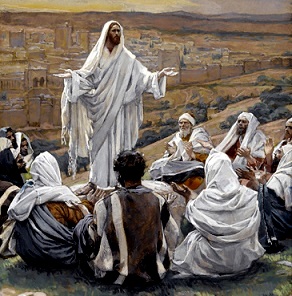
It seems that most organizations have an “in crowd” –even our parish communities. There are those who seem to be “in the know” and determine the direction of the organization. Those outside this “inner circle” often feel left out and even resentful that they are not included in the deliberations of the leaders.
What about Jesus and the organization that he was forming. Was there an “inner circle” of special people who were on the “ins” with Jesus? Were there people who felt left out? We get a glimpse into this issue when we read today’s gospel selection (Mark 3:31-35).
“The mother of Jesus and his brothers arrived at the house. Standing outside, they sent word to Jesus and called him. A crowd seated around him told him, ‘Your mother and your brothers and your sisters are outside asking for you.’ But he said to them in reply, ‘Who are my mother and my brothers?’ And looking around at those seated in the circle he said, ‘Here are my mother and brothers.’”
Surely Jesus’ mother, brothers, and sisters would be part of his inner circle. Yet when they showed up at his house, Jesus put them off. He spoke of a different definition of mother and brothers. Jesus was introducing a new family of God on this earth that was superior in status to his natural family. Citizens of the Kingdom of God were the ones close to him, and in the new order that Jesus was establishing, Kingdom relationships took priority even over family relationships. When Jesus spoke of the requirements of discipleship, he said that if anyone wanted to follow him, they were to hate father and mother, wife and children, and even their own lives. Jesus had to be first.
Looking again at this gospel scene, we see Jesus and a small group sitting in a circle. He was not standing up in front of them as a priest does when he delivers a homily. Jesus appeared to be at the same level as the people. At the front door, clearly outside this “inner circle,” were Mary and Jesus’ close relatives. What was happening in the circle was more important to Jesus than what was going on outside it. St. Mark does not give us the names of those in the “inner circle,” but, no doubt, they were lowly, ordinary folks. Dignitaries, leaders of synagogues, theological professors were probably not included.
Jesus concluded with a short teaching:
“For whoever does the will of God is my brother and sister and mother.”
There was one qualification for membership in the Kingdom of God—doing the will of God. One’s financial status, theological training, and position of office did not matter to Jesus. What counted was that a person surrenders their life to doing God’s will; that was the ticket into Jesus’ “inner circle.” As Adam’s disobedience removed him from God’s inner circle, so it was total obedience that brought men and women back into it.
Though we like to be part of the “in crowd” and wield influence in our parishes and communities, we recognize that this is not what impresses God. To be a disciple of Jesus, our one and only one goal is to do God’s will in our lives.
